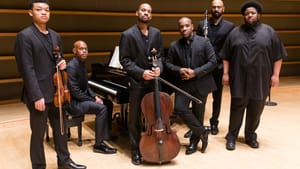Stay in the Loop
BSR publishes on a weekly schedule, with an email newsletter every Wednesday and Thursday morning. There’s no paywall, and subscribing is always free.
Reframing the musical narrative
Opera Philadelphia presents Tyshawn Sorey and Terrance Hayes's 'Cycles of My Being'

Lawrence Brownlee, star of Cycles of My Being — a song cycle co-commissioned by Opera Philadelphia (where Brownlee serves as an artistic advisor), Lyric Opera of Chicago, and Carnegie Hall — refuses to rest on his laurels. A dynamic tenor well into the third decade of his career, he could easily collect fat paychecks singing Rossini and Donizetti roles around the world. It’s a repertory in which he has few equals. But Brownlee smartly pushes himself vocally and dramatically, often with thrilling and intellectually stimulating results.
Cycles of My Being demonstrates the searching quality that sets Brownlee apart from many of his contemporaries. With music by Tyshawn Sorey and texts by the poet Terrance Hayes, the six-song work explores the complex physical and emotional experiences black men face in America. Opera Philadelphia presented the world premiere at the Perelman Theater; next, it travels to Chicago and New York.
Scored in Philadelphia for four instruments and one voice, the work opens with the haunting and melancholy “Inhale, Exhale.” Sorey’s musical language evokes modernism and minimalism, with jittering arpeggios from Randall Mitsuo Goosby’s violin and Khari Joyner’s cello, mixed with traditional jazz underpinnings from Kevin J. Miller’s piano and Alexander Laing’s clarinet. In nine lines, Brownlee charts a journey of African-American history from kidnapping and enslavement to the present day.
"Black boxes of cargo"
“America — I hear you hiss and stare,” he sings with clarion beauty. “Do you love the air in me, as I love the air in you?” The text sharply captures the sentiments of those who feel their patriotism is often a one-sided relationship. This sometimes perplexing love affair began with “black boxes of cargo” and too often ends, prematurely, with “black boxes in holes.”
Hayes has long been a poet unafraid of infusing his work with bitter irony. This comes through keenly in two songs, both titled “Hope.” The affirmation-laden texts disarm the listener, as Brownlee sings that “when unwell, hope is medicine” or “when sleeping, hope is a lullaby.” But Hayes knows how to land a punch, which comes in the final line: “When dead, hope is life.”
It’s a simple, forthright observation. But it also encompasses the uncomfortable and painfully common truth that a black man’s fate can be decided in a split second. It has the power to suck the air out of the room, as does the pointed conclusion of “Hate,” which precedes it: “I hate that your hate can decide my own fate.”

Both songs ask the audience — many of whom will be white, economically secure, and privileged in numerous ways — to consider the volatility of a lived experience they will never fully understand.
Undeniable artistry
The cycle ends with “Each Day I Rise, I Know,” which shows Brownlee, Sorey, and Hayes individually at their virtuosic best. Sorey blends traditional forms of spiritual and call-and-response (with the fellow musicians acting as chorus) with writing that shows off Brownlee’s melismatic gifts. Hayes’s text segues from imagistic phrases to declarations of self-actualization, as the singer intones, “Each day I rise, I know / I have something to love.”
Throughout the cycle Brownlee proves himself a keen textual interpreter, performing with a commitment not only to the words and notes but to the ideas behind them. Whether parsing concrete statements or stylized lyrics that audience members can color with their own meaning, he never settles for mere tonal beauty in his presentation. His artistry is undeniable.
The remainder of the program provided opportunities for the instrumentalists to shine. Goosby performed the first movement of Brahms’s Violin Sonata No. 2 in A Major with a welcome airiness, although his sound could benefit from additional resonance. In contrast, Joyner found every mournful emotion in the opening threnody from Samuel Barber’s Sonata for Violoncello and Piano, Op. 6. Miller provided highly capable support at the piano for both.
Laing played clarinet arrangements of three spirituals, including a particularly stirring rendition of “Balm in Gilead” that prompted the woman seated next to me to offer a hearty “Amen!” He remarked from the stage that spiritual concert tours were common in the late 19th century and were used to raise money for black colleges and universities. Such concerts also served as an argument against minstrelsy, as many white audiences encountered actual black bodies on stage for the first time.
It is still exceedingly and shamefully rare to encounter a classical-music concert populated entirely by black men. Brownlee, Sorey, Hayes, and Opera Philadelphia should be commended for bringing the conversation to center stage.
What, When, Where
Cycles of My Being. Written by Tyshawn Sorey and Terrance Hayes. Lawrence Brownlee, tenor; Randall Mitsuo Goosby, violin; Khari Joyner, cello; Alexander Laing, clarinet; Kevin J. Miller, piano. Opera Philadelphia. February 20, 2018, at the Kimmel Center’s Perelman Theatre, 300 S. Broad Street, Philadelphia. (215) 732-8400 or operaphila.org.
Sign up for our newsletter
All of the week's new articles, all in one place. Sign up for the free weekly BSR newsletters, and don't miss a conversation.
 Cameron Kelsall
Cameron Kelsall